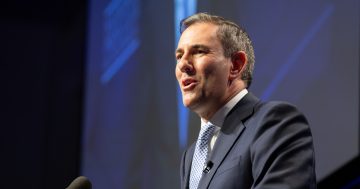
The RBA hopes to save consumers $1.2 billion a year by ending surcharges on credit card payments. Photo: File.
The Reserve Bank of Australia wants to get rid of payment card surcharges and Treasurer Jim Chalmers seems to like the idea.
Cafe and restaurant owners, however, are not so impressed.
The RBA has issued a consultation paper that proposes to remove surcharges on eftpos, Mastercard and Visa cards, saying the move would save consumers $1.2 billion a year.
That equates to a $60 annual saving for most individual card users.
“Surcharging is no longer achieving its intended purpose of steering consumers to make more efficient payment choices,” the RBA says.
“Avoiding surcharges has become harder as cash usage has declined, businesses are increasingly charging the same surcharge rate across debit and credit and there are significant challenges with enforcing the current surcharging rules.
“Removing surcharging would make card payments simpler, more transparent and help to increase competition in the card payments system.”
The consultation is part of the bank’s Review of Merchant Card Payment Costs and Surcharging, and follows the release of its issues paper in October last year.
It has already reached the preliminary view, however, that it would be in the public interest to remove the card charges.
The RBA also wants to save businesses about $1.2 billion annually by lowering the cap on interchange fees.
“Around 90 per cent of Australian businesses are estimated to be better off under the proposed policies,” it says.
“The proposed reductions to interchange caps would benefit small businesses the most, as they tend to pay fees closer to the existing caps.
“Introducing caps on foreign interchange fees would help to lower fees for all businesses accepting international cards.”
The bank’s third proposal is to require card networks and large acquirers to publish the fees they charge.
“Improving transparency and competition will help all players better understand the fees they are charged and make it easier for businesses to shop around for a better deal,” the RBA’s statement says.
The Federal Treasurer appears initially supportive of the proposals, saying Australians are “getting slugged” by surcharges even when they use their own money.
“The RBA’s preliminary view is that surcharging should be removed on debit, prepaid and credit cards, but this should be complemented with measures that reduce costs for the vast majority of small businesses,” Dr Chalmers said.
“The RBA expects to be able to implement these changes under its own powers, subject to the outcomes of its consultation.
“We take the RBA’s views seriously and will consider their recommendations along with broader industry feedback.”
The hospitality sector is far from supportive, with the Australian Restaurant and Cafe Association (ACRA) criticising the RBA’s proposal as a “short-sighted, anti-small business policy” that will drive up menu prices and put further pressure on the industry.
“This proposal is tone-deaf and anti-small business,” ACRA chief executive officer Wes Lambert said.
“Who the hell does the RBA think will bear the cost of this ridiculous decision?
“First, merchants and then customers, through higher menu prices in the middle of a cost-of-living crisis.
“No matter how low merchant fees go based on the RBA’s intention to save businesses $1.2 billion, with no surcharging, businesses who previously paid net $0 in merchant fees, will now be faced with the bill.”
Mr Lambert noted that under the proposal, businesses would no longer be allowed to recover the real costs of accepting tap-and-go and credit card payments, which currently average 1–1.5 per cent per transaction.
These fees would become an “invisible tax on small businesses” that cannot access the bulk discounts negotiated by big retailers or corporate groups.
“Restaurants are not banks. We do not have the luxury of absorbing thousands of dollars in hidden transaction costs,” he said.
“A blanket ban on surcharging will undermine small businesses, reduce price transparency, and mandate price hikes across every menu in Australia.”
The RBA is inviting feedback on the proposed policy options and draft standards by 26 August 2025.
The changes will not need legislation and, subject to the consultation, the bank hopes to have them in place by July 2026.
Original Article published by Chris Johnson on Region Canberra.








